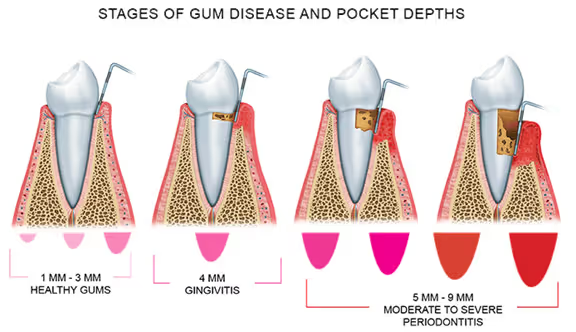

Periodontal disease causes destruction of the bone and tissue around your teeth. Eventually when there has been so much destruction, your teeth don’t have enough bone to hold them securely and they start to become loose. This can become so severe that you can lose otherwise perfectly healthy teeth.
Periodontal Disease floods your bloodstream with bacterial toxins, making your whole body inflamed. It increases risk and severity of diabetes, heart disease, stroke, dementia and more. The type of bacteria causing periodontal disease have been found in the lungs due to breathing them in, as well as in the blockages that have caused strokes and in the womb, which is the link to premature birth.
We are passionate about helping our patients achieve gum health. There are clinicians with special interest in treating severe periodontal disease. Not only are we very experienced in periodontal therapy, we have many different ways we can approach your treatment plan.
We have invested in the latest technology as well as the most cutting edge education for our dentists. The below are some of the treatments we consider during your examination. We will discuss what is relevant for you after considering your age, disease severity, wants and needs.

Periodontal disease is caused by a buildup of plaque, which is a sticky film of bacteria that forms on your teeth. If plaque is not removed through regular brushing and flossing, it hardens into tartar that cannot be cleaned away at home. This leads to inflammation of the gums, known as gingivitis, and if left untreated, it can develop into periodontal disease. Other factors that can contribute include smoking, poor oral hygiene, genetics, certain medications, health conditions such as diabetes, and even stress.
Gingivitis is the early stage of gum disease. It involves inflammation of the gums, often causing redness, swelling, and bleeding during brushing or flossing. At this stage, the damage is still reversible with proper care. Gum disease, or periodontal disease, is the more advanced stage. It affects not just the gums but also the bone that supports your teeth. If left untreated, it can lead to gum recession, tooth mobility, and even tooth loss.
Your mouth has a lot of blood supply, which means a lot of those bacterial toxins being released goes into your bloodstream. It's shown that this causes a lot of stress for your body through widespread inflammation. Although the wall of gum tissue surrounding your teeth may seem small, if you lay it out, the infected area of someone with moderate levels of disease is equal to the size of your palm.
That’s almost 1% of your total body surface area. If we had something of that size covered by active bacterial infection that was dissolving your bone anywhere else on your body, we wouldn’t be so dismissive.
Anyone can develop periodontal disease, but some people are more at risk than others. Factors that increase susceptibility include poor oral hygiene, smoking, diabetes, a family history of gum disease, hormonal changes such as during pregnancy, certain medications, and a weakened immune system. Age can also play a role, as the risk tends to increase over time. Regular dental checkups and good oral care can help manage these risks.
Smoking makes periodontal disease worse in several ways. It slows down healing, weakens the body’s immune response, and reduces blood flow to the gums. This means infections can develop more easily and be harder to treat. Smoking can also hide the signs of gum disease, like bleeding or swelling, making it harder to catch early. Overall, smokers are more likely to develop severe gum problems and are less likely to respond well to treatment.
Diabetes and periodontal disease are closely linked. High blood sugar levels can weaken the immune system and make it harder for the body to fight off gum infections. At the same time, gum disease can make it more difficult to control blood sugar, creating a two-way relationship. People with diabetes are more likely to develop more severe forms of periodontal disease and may heal more slowly after treatment. Managing both conditions together is important for overall health.
Periodontal disease can raise the risk of heart disease because the inflammation and bacteria in the gums can enter the bloodstream. Once there, they may contribute to the buildup of plaque in the arteries, which can lead to heart problems like clogged arteries, heart attacks, or strokes. Ongoing gum inflammation puts extra stress on the body and can worsen existing heart conditions. While it does not cause heart disease directly, it is considered a contributing risk factor.
Call us at (02) 6766 1766 or book online to schedule your consultation. Whether it’s a simple check-up or more complex issue, our experienced team is here to help. Let us take care of your smile with the compassion and expertise you deserve!